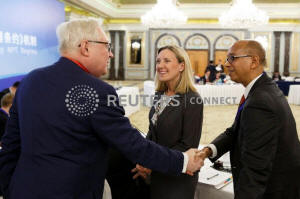|
U.S. to stop complying with nuclear pact
with Russia after talks flop
 Send a link to a friend
Send a link to a friend
 [January 31, 2019]
By Michael Martina and Andrew Osborn [January 31, 2019]
By Michael Martina and Andrew Osborn
BEIJING/MOSCOW (Reuters) - The United
States will stop complying with a landmark nuclear pact with Russia as
soon as this weekend after last-ditch talks with Moscow to save it fell
flat, a senior U.S. arms control official said on Thursday.
Washington has long accused Russia of flouting the 1987
Intermediate-range Nuclear Forces Treaty (INF), alleging that a new
Russian missile, the Novator 9M729, called the SSC-8 by NATO, violates
the pact, which bans either side from stationing short- and
intermediate-range, land-based missiles in Europe.
Russia denies that, saying the missile’s range puts it outside the
treaty, and has accused the United States of inventing a false pretext
to exit a treaty Washington wants to leave anyway so as to develop new
missiles. It has also rejected a U.S. demand to destroy the new missile.
U.S. Under Secretary of State for Arms Control and International
Security Andrea Thompson on Thursday held last-ditch talks with Russian
Deputy Foreign Minister Sergei Ryabkov in Beijing ahead of the
expiration of a U.S. 60-day deadline for Moscow to come back into
compliance with the treaty.

Thompson and Ryabkov, who met on the sidelines of a P5 meeting of
nuclear powers, said afterwards that the two countries had failed to
bridge their differences.
In an interview, Thompson said she expected Washington to now stop
complying with the treaty as soon as this weekend, a move she said would
allow the U.S. military to immediately begin developing its own
longer-range missiles if it chose to do so, raising the prospect they
could be deployed in Europe.
"We’ll be able to do that (suspend our treaty obligations) on Feb. 2,"
Thompson told Reuters. "We’ll have an announcement made, follow all the
steps that need to be taken on the treaty to suspend our obligations
with the intent to withdraw.”
The formal withdrawal process, once announced, takes six months.
Stopping compliance with the treaty would untie the U.S. military's
hands, she said.
[to top of second column]
|

Russian Deputy Foreign Minister and head of delegation Sergey
Ryabkov (L) greets U.S. delegation head Under-Secretary of State
Andrea Thompson (C) and U.S. Permanent Representative to the
Conference on Disarmament Robert Wood at a Treaty on the
Non-Proliferation of Nuclear Weapons (NPT) conference with the UN
Security Council's five permanent members (P5) China, France,
Russia, Britain, and U.S., in Beijing, China, January 30, 2019.
REUTERS/Thomas Peter/Pool

"We are then also able to conduct the R&D and work on the systems we
haven’t been able to use because we’ve been in compliance with the
treaty," said Thompson. "Come February 2, this weekend, if DoD (the
U.S. Department of Defense) chooses to do that, they’ll be able to
do that.”
Washington remained open to further talks with Moscow about the
treaty regardless, she added.
Ryabkov said Moscow would continue working to try to reach agreement
despite the failure of the talks, but accused Washington of ignoring
Russian complaints about U.S. missiles and of adopting what he
called a destructive position.
"The United States imposed a 60-day period during which we had to
fulfill their ultimatum," the Sputnik news agency cited Ryabkov as
saying after talks with Thompson.
"I conclude that the United States was not expecting any decision
and all this was a game made to cover their domestic decision to
withdraw from the INF Treaty."
(Additional reporting by Maxim Rodionov and Tom Balmforth; Writing
by Andrew Osborn; Editing by Peter Graff)
[© 2019 Thomson Reuters. All rights
reserved.]
Copyright 2019 Reuters. All rights reserved. This material may not be published,
broadcast, rewritten or redistributed.
Thompson Reuters is solely responsible for this content.
 |